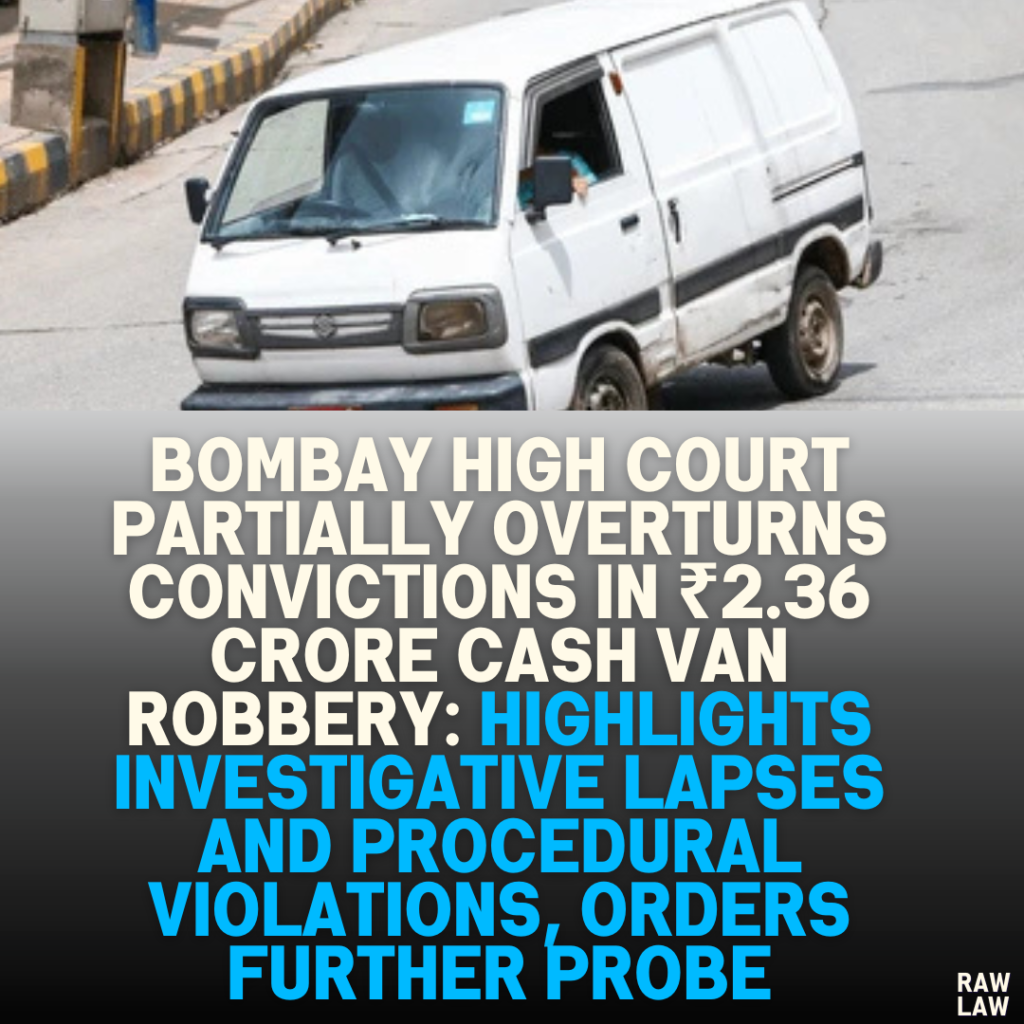1. Court’s Decision
The Bombay High Court analyzed appeals filed by several accused persons convicted by the Additional Sessions Judge, Wardha, for their roles in the robbery of Rs. 2.36 crore from a cash van. The court identified serious flaws in the investigation conducted by the police, which cast doubts on the prosecution’s case. It questioned the reliability of evidence presented, especially regarding the loading of cash, identification of the accused, and recovery of stolen amounts.
The court:
- Partially upheld convictions for accused where evidence was strong.
- Acquitted others where the prosecution failed to prove guilt beyond reasonable doubt.
- Directed further investigation to address lapses and procedural irregularities.
2. Facts
- The incident took place on March 7, 2013, when a cash van transporting Rs. 2.36 crore from Axis Bank, Akola, to Nagpur was intercepted by individuals posing as police officers.
- The robbers forced the van to stop on a highway, diverted it to a remote location, looted the cash, and locked the van’s occupants in the vehicle.
- The incident was reported, and an investigation ensued, leading to the recovery of approximately Rs. 1.97 crore and arrests of multiple individuals.
- The accused were tried under several sections of the IPC, including dacoity (Section 395), criminal conspiracy (Section 120-B), and dishonestly receiving stolen property (Section 412).
3. Issues
The court deliberated on the following key questions:
- Was it conclusively proven that Rs. 2.36 crore was loaded in the cash van?
- Were the accused correctly identified during the investigation and trial?
- Did procedural lapses, such as improper evidence handling and identification processes, undermine the prosecution’s case?
- Were recoveries of cash from the accused validly proven?
4. Petitioner’s (Accused’s) Arguments
- Flaws in Evidence: The defense pointed out discrepancies in the banking documents regarding the amount of cash loaded in the van. The remittance register had calculation errors, and no direct proof confirmed that Rs. 2.36 crore was transported.
- Inconsistent Witness Testimonies: Eyewitness accounts of the robbery were contradictory, particularly about the roles of the accused during the robbery.
- Procedural Violations:
- The test identification parade was allegedly compromised as the accused were shown to witnesses before the parade.
- The GPS of the cash van was not seized, which could have provided crucial data.
- Recovery Doubts: The defense questioned the authenticity of cash and weapon recoveries, emphasizing the lack of independent witnesses.
5. Respondent’s (Prosecution’s) Arguments
- Strong Eyewitness Testimony: The prosecution argued that the testimonies of the cash van occupants consistently identified the accused as participants in the robbery.
- Recovery of Stolen Cash: Large amounts of cash with identifiable bank labels were recovered from the possession of the accused, corroborating the prosecution’s case.
- Lapses Do Not Overrule Evidence: The prosecution maintained that minor investigative lapses, such as incomplete documentation, did not diminish the strength of the evidence against the accused.
6. Analysis of the Law
- Burden of Proof: The court stressed that the prosecution must establish the guilt of the accused beyond a reasonable doubt.
- Evidentiary Gaps: The prosecution failed to present clear and conclusive evidence about the exact amount of cash loaded in the van and the integrity of recovered cash.
- Procedural Integrity: Investigative lapses such as improper test identification parades and missing evidence (GPS logs, bank records) undermined the reliability of the case.
7. Precedent Analysis
The court relied on prior judgments where procedural lapses or inconsistencies in prosecution evidence led to acquittals. It emphasized that:
- Investigative integrity is critical in ensuring fair trials.
- Procedural errors must not compromise the rights of the accused.
8. Court’s Reasoning
- Discrepancies in Cash Loading Evidence:
- The remittance register entries regarding the cash loaded in the van were inconsistent. A calculation error indicated Rs. 19.5 lakh instead of Rs. 1.95 crore for Rs. 100-denomination notes.
- The investigating officer failed to produce corroborative evidence, such as statements from senior bank officials or detailed bank records.
- Witness Testimonies:
- Witnesses provided contradictory accounts of the robbery, including the sequence of events and the roles of the accused.
- The court highlighted the absence of independent witnesses despite the robbery occurring on a busy highway.
- Investigative Failures:
- The GPS device in the cash van was not seized, which could have verified the van’s movements and corroborated witness accounts.
- The test identification parade was improperly conducted, as accused persons were shown to witnesses beforehand.
- Recovery of Stolen Cash:
- While cash was recovered from the accused, discrepancies in the amounts and lack of independent verification raised doubts about the legitimacy of the recoveries.
9. Conclusion
The court concluded that the prosecution failed to establish the guilt of some accused beyond reasonable doubt. It acquitted several individuals while upholding convictions where corroborative evidence supported the charges. Additionally, it directed further investigation to address unresolved issues and lapses.
10. Implications
- Law Enforcement: Highlights the importance of maintaining procedural integrity during investigations to avoid jeopardizing cases.
- Judiciary: Reinforces the role of courts in safeguarding the rights of the accused and ensuring fair trials.
- Precedent Value: Sets a benchmark for scrutinizing investigative processes and evidence handling in criminal cases.



